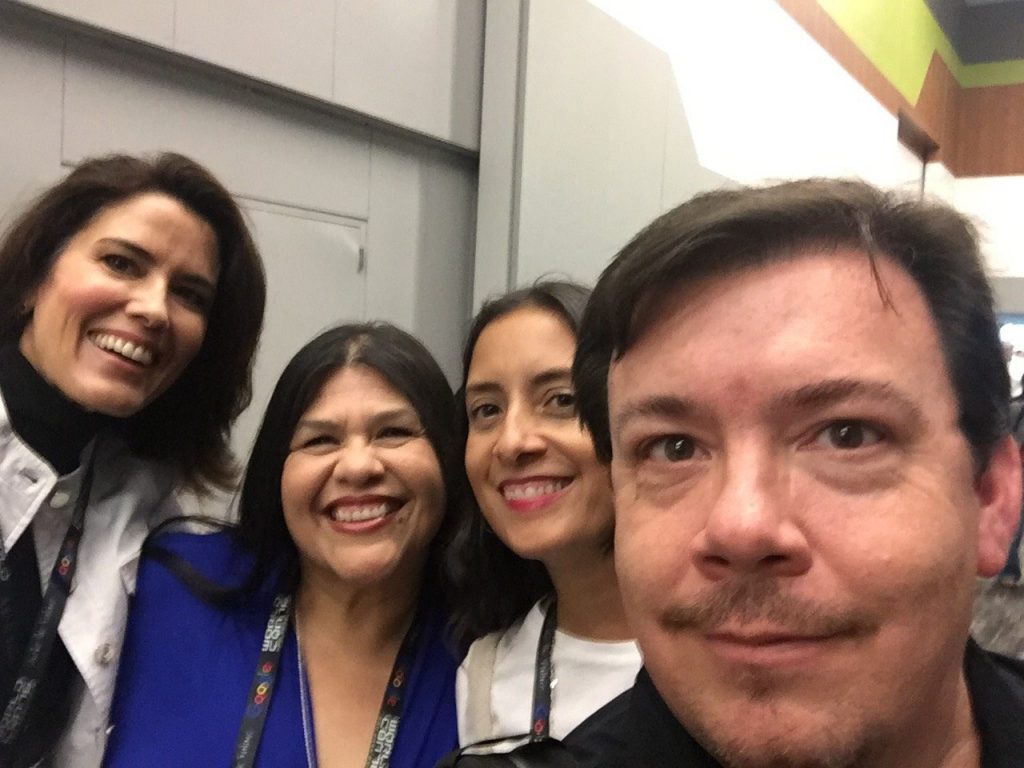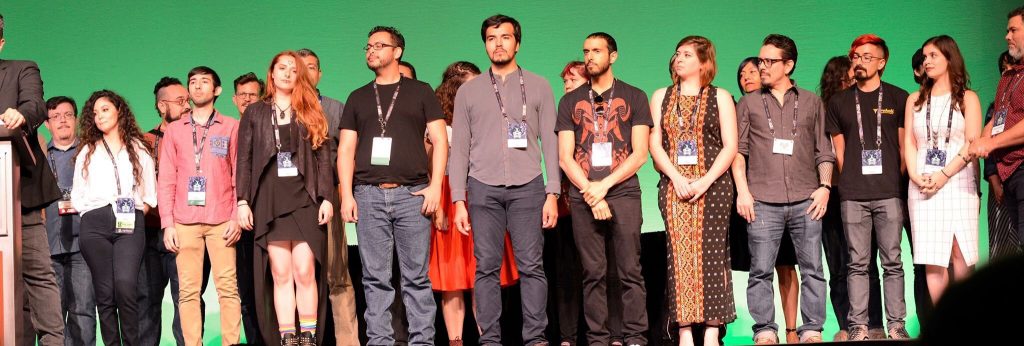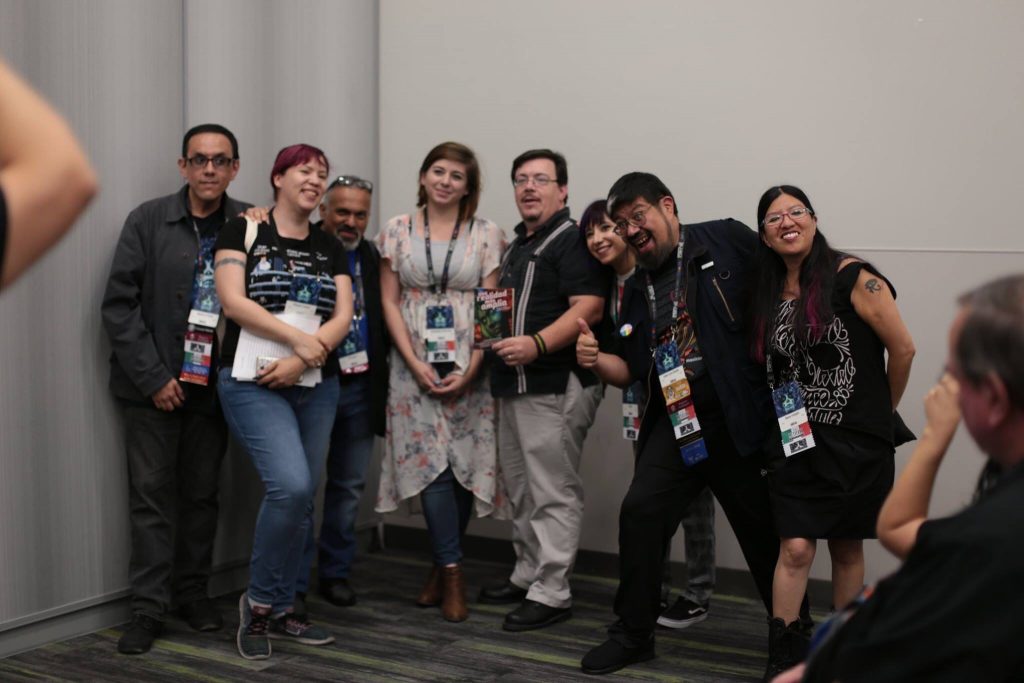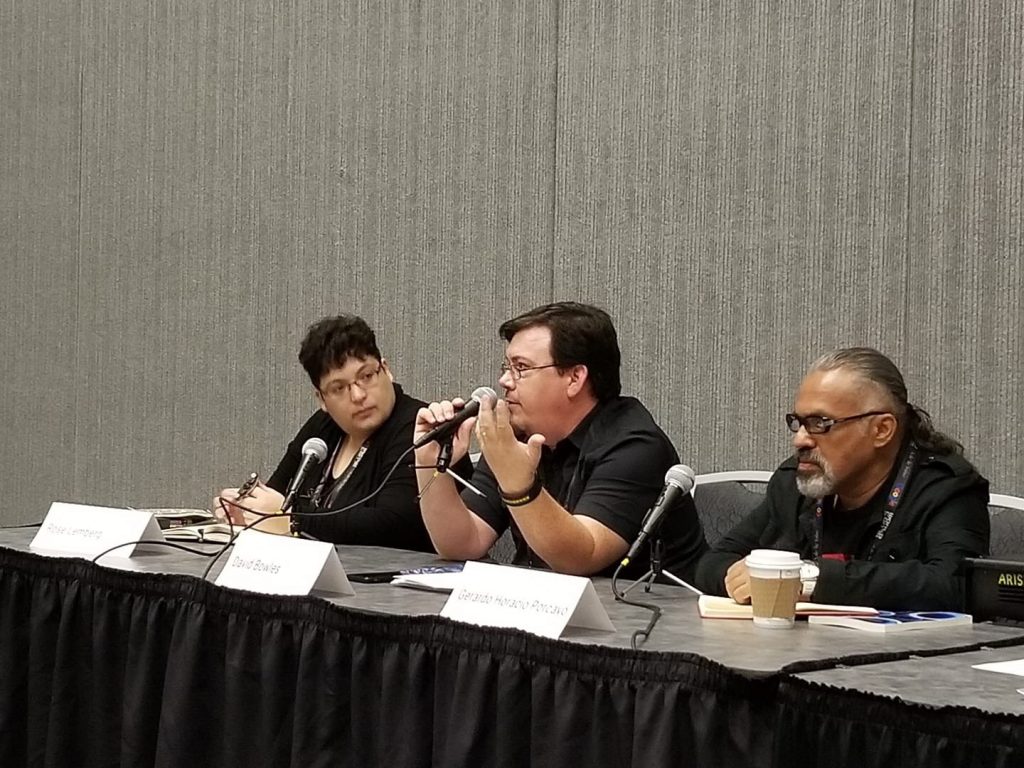Each year, WorldCon (the World Science Fiction Convention) gathers fans and creators of science fiction and fantasy. Among many things that happen at WorldCon is the awarding of the Hugos, something like the Oscars for speculative fiction. The first convention took place in New York City in 1939, and every year after, it has been held in a different city, organized by volunteers. In 2018, Worldcon 76 was held in San Jose, California.
Now, the thing to remember is that people of color—especially Latinx folx—have been largely absent from WorldCon during its 76 years. But this year, one of the guests of honor was illustrator John Picacio, the first Mexican American to win a Hugo (and first to serve as MC). He wanted to make sure Mexicans and Mexican Americans would be there in significant numbers.
So John founded the Mexicanx Initiative, at first intending to sponsor just a couple of key creators. But when he announced it, a dozen or so movers and shakers in the world of SF/F stepped up to contribute, and before long there was enough support to bring FIFTY Mexicanx writers, illustrators, megafans, etc. Guadalupe García McCall and David Bowles were invited to be part of this stellar group. They were placed on panels, brought into the spotlight, allowed to stand on the stage in solidarity with Dreamers and refugees.
It was a gamechanging moment.
Guadalupe García McCall: I wasn’t able to attend the whole event, so I was only there for the weekend. I drove down from Oregon, through the dark skies created by the Oregon/California fire smoke, and attended two different panels.
David Bowles: And I almost didn’t make it! My son and I were going to roadtrip our way to California, but early on in the trek, my car broke down. A couple of dear friends, however—knowing what the Initiative meant to me—bought my son and me roundtrip tickets to San José. It was humbling and beautiful.
After the Mexicanx Initiative reception (with amazing food from Héctor González and an appearance by George R.R. Martin), I was on several panels. On Friday I hosted Spanish-language readings from the special anthology we put together for WorldCon. Then I was off to a panel on the use of Latinx versus Hispanic, Chicano, or other labels. The following day came the “Transgressing Borders” panel, which I moderated, holding a conversation with Gerardo Horacio Porcayo and Rose Lemberg about stories and voices that slip back and forth across artificial divides or that exist in liminal spaces.
GGM: On Saturday, I was on “The Future of Middle-Grade SF/F in America.” In this panel we discussed the statistics: in 2016, Asian/Asian American authors wrote roughly only 6% of the new children’s books published with Black, Latinx, and Native authors combined writing less than 6%. The panelists, J.C. Cervantes, Christine Taylor-Butler, Zora Mai Quynh and I, discussed how diverse writers are using their unique experiences to build rich, complex, new worlds. This panel was very informed, and there were a great many statistics and facts brought into the conversation. I think the WorldCon audience was ready to hear this information. They asked relevant questions that showed they wanted to hear why diverse voices are needed in books.
On Sunday, I was in the “YA vs Adult Fiction: Defining Boundaries” panel with Fonda Lee, Fred Wiehe, Katrina, Archer, Miriam Weinberg, and Sarah Rees Brennan. We discussed why YA fiction is a crucial part of the SF/F world. We attempted to delineate how YA is different from adult fiction, how we as writers approach writing differently in terms of voice, structure, themes. This was an interesting panel in that we had to talk about our craft, the way we write YA, and why we know when we “listen” to the main characters of our books that we are indeed writing a YA novel.

Guadalupe and David pose with fellow Mexicanx Initiative member J.C. Cervantes and fellow Latina Lilliam Rivera.
DB: My Sunday panel was “Recommended Reading in Webcomics” with luminaries like Ursula Vernon, Henry Jenkins and Der-shing Helmer alongside fresh Mexicanx faces like Gonzalo Álvarez and Aaron Durán. I also accompanied some of our Mexican national siblings, translating for them on a couple of panels.
GGM: Being among so many Mexicanx writers of SF/F was a validating experience. I felt blessed to be given an opportunity to represent Mexican/Mexican American writers. When I sat in the audience and listened to the Mexican nationals discuss the work they are doing in Mexico, I loved how they spoke of their colleagues, the writers who were at home and couldn’t come to the US to share. On Sunday morning, when I spoke to Alberto Chimal and Raquel Castro in the green room, they expressed to me that they gave shoutouts to their contemporaries because they saw themselves as embajadores, representatives of the work and writers from across our US/Mexico border. They were humble and genuine and I felt honored to be in their presence, listening to them speak for their people.
It is true what they said. It is our responsibility to lift our voices in unison so that we can be heard, but two voices are better than one, and four is better than two, but 50 is better still. That’s why the Mexicanx Initiative was so important, so necessary at this time. It illustrated how by giving each other grace, lifting each other up and carving out opportunities to showcase our collective talents, we are paving roads not only for those who cannot speak for themselves but also those who will come after us.
I truly believe that with faith and hard work, anything is possible. We have to have faith in our capacity to turn the tide, to raise the standards in this business. By holding ourselves to that higher standard, creating and calling attention to the great work our colleagues are developing, we raise awareness in this country. But we have to actively look for other opportunities to gain visibility and then answer the call to action. As John Picacio proved, it starts with one voice, one kindness, and pretty soon others will follow. Others will answer the call. There are people out there willing to help us. We just have to move. Nothing happens without movimiento. Nothing happens without faith.
DB: Amen to all of that. Relationships were forged during those few days that have only grown stronger in the subsequent months. New projects are in the works, collaborations between and among members of the Initiative.
WorldCon was just a spicy appetizer, y’all. The main course is cooking. Get ready.











